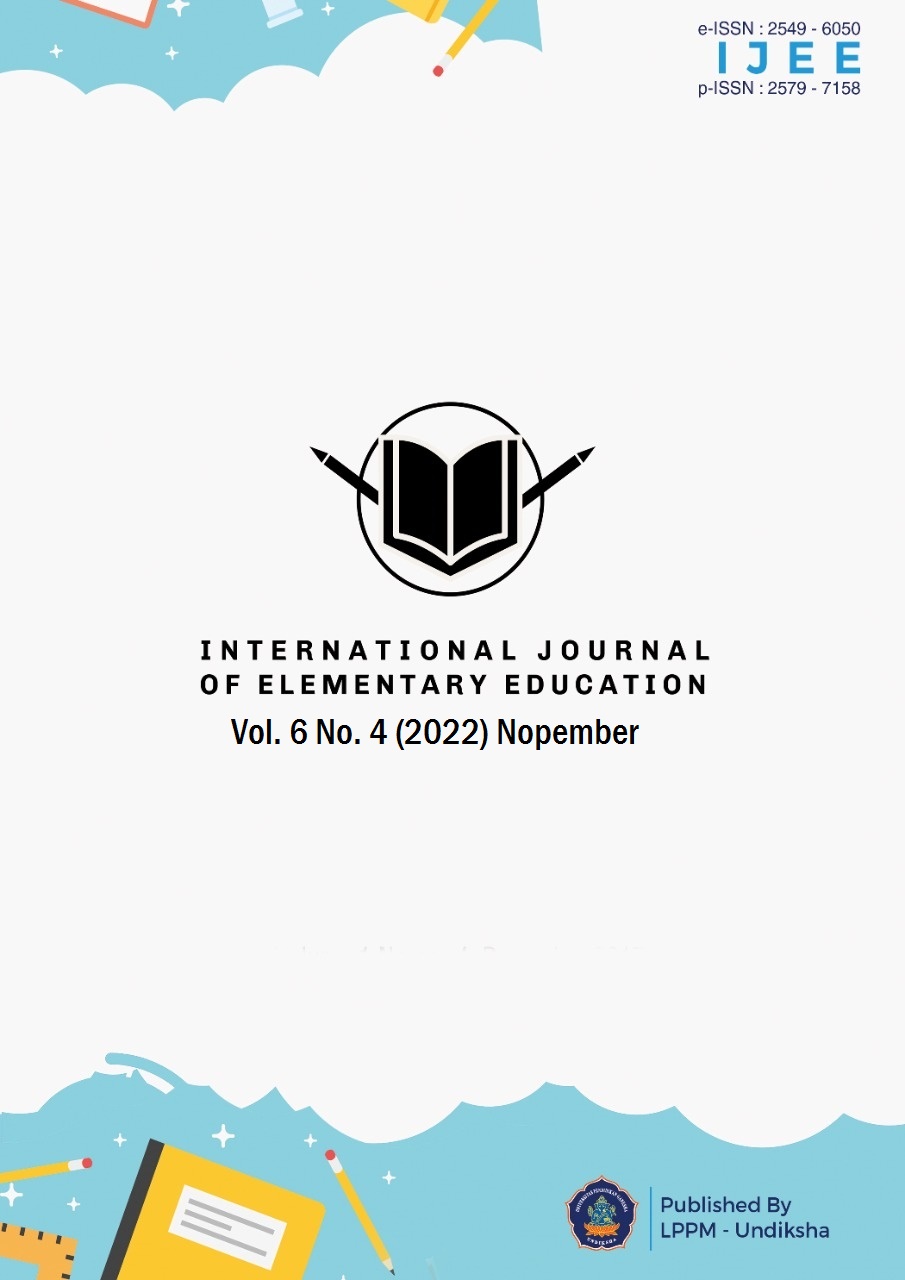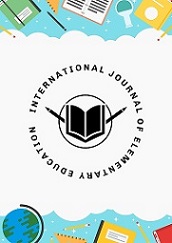Entrepreneurship Extracurriculars in Developing Entrepreneurial Character for Elementary School Students
DOI:
https://doi.org/10.23887/ijee.v7i1.54914Keywords:
Entrepreneurship extracurricular, Entrepreneurial character, Case studyAbstract
A busy schedule of lessons makes entrepreneurship learning almost impossible. On the other hand, the importance of entrepreneurial character education must be developed since children learn at the elementary school level. Entrepreneurial extracurricular activities can be one of the entrepreneurial character-building programs. The purpose of this study was to analyze the entrepreneurial character of students in the implementation of extracurricular entrepreneurship. The subjects in this study were students of grades 4 and 5 in elementary schools. This study uses a qualitative research approach with a descriptive type. The data collection techniques used include interviews and observation. The data analysis techniques use interactive models, namely data collection, data reduction, data presentation, and concluding. The data validity test was carried out using technical triangulation and source triangulation. The results showed that the implementation of entrepreneurship extracurricular activities included making crafts from used goods and making spinach chips. Entrepreneurial character instilled from making crafts from used goods and making spinach chips, namely self-confidence, hard work, self-consistency, and creative personality. The conclusion of the research is with the implementation of entrepreneurship extracurriculars in schools, it can instill the entrepreneurial character of students needed so that later they will have an entrepreneurial attitude.
References
Abidin, A. M. (2019). Penerapan Pendidikan Karakter Pada Kegiatan Ekstrakurikuler Melalui Metode Pembiasaan. Didaktika: Jurnal Kependidikan, 12(2), 183-196. https://doi.org.10.30863/didaktika.v12i2.185. DOI: https://doi.org/10.30863/didaktika.v12i2.185
Aisyah, M. (2020). Pembentukan Karakter Percaya Diri Siswa melalui Program Ekstrakurikuler Kewirausahaan di SD Anak Saleh Kota Malang. In Proceeding of International Conference on Islamic Education (ICIED), 5, (1), 156-160. http://conferences.uin-malang.ac.id/index.php/icied/article/view/1239.
Al-Azizi, N. Q. U. (2018). Kegiatan ekstrakurikuler kepramukaan terhadap pendidikan karakter kedisiplinan. Jurnal Pendidikan Luar Sekolah, 12(2), 40-50. http://dx.doi.org/10.32832/jpls.v12i2.2793. DOI: https://doi.org/10.32832/jpls.v12i2.2793
Andriany, D., Putra, P., & Ramadhan, H. (2022). Implementing Entrepreneurship Education in Extracurricular Activity (ECA) for Students. International Journal of Education in Mathematics, Science and Technology, 10(4), 955-970. https://eric.ed.gov/?id=EJ1346935. DOI: https://doi.org/10.46328/ijemst.2621
Ardiansyah, M., Basri, S., & Irmawati, I. (2022). Analisis Kompetensi Kewirausahaan Kepala Sekolah Dasar. Jambura Journal of Educational Management, 2(1) 28-43. https://doi.org/10.37411/jjem.v3i1.1263. DOI: https://doi.org/10.37411/jjem.v3i1.1263
Arjanto, P., & Mustiningsih, M. (2022). How Principles Develop Entrepreneurship In School? : A Literature Review. RUSSELL: Journal of Educational Sciences, 1(1), 1-24. https://ojs3.unpatti.ac.id/index.php/russel/article/view/5962.
Besten, K. (2018). Shine: 5 Prinsip Untuk Membuat Usaha Dan Karir Anda Melejit. PT Gunung Mulia.
Dahliyana, A. (2017). Penguatan pendidikan karakter melalui kegiatan ekstrakurikuler di sekolah. Sosio Religi: Jurnal Kajian Pendidikan Umum, 15(1). https://ejournal.upi.edu/index.php/SosioReligi/article/view/5628.
Fikri, M. A. A. (2022). Evaluasi Pelaksanaan Program Kewirausahaan di Sekolah Insan Al Madani Bogor. Jurnal Pendidikan, Sains Sosial, Dan Agama, 8(1), 1-7. https://doi.org/10.53565/pssa.v8i1.499. DOI: https://doi.org/10.53565/pssa.v8i1.499
Hakim, T. (2018). Mengatasi Rasa Tidak Percaya Diri. Jakarta: PT. Puspa Swara.
Hane, F., Petrus, & Geradus, U. (2022). Implementasi Pembelajaran Karakter Disiplin, Kerja Keras, dan Cinta Kasih Melalui Ekstrakurikuler di Sekolah Dasar. Journal of Innovation Research and Knowledge, 2(3), 781-792. https://www.bajangjournal.com/index.php/JIRK/article/view/3138.
Hasan, M., Azizah, N., Nurjannah, N., Nurdiana, N., & Arisah, N. (2022). Pengembangan Pembelajaran Kecakapan Hidup Berbasis Karakter Kewirausahaan pada Jenjang Sekolah Dasar. Jurnal Basicedu, 6(3), 4299-4309. https://doi.org/10.31004/basicedu.v6i3.2791. DOI: https://doi.org/10.31004/basicedu.v6i3.2791
Hasanah, U. (2019). Upaya Menumbuhkan Jiwa Entrepreneurship Melalui Kegiatan Market Day Bagi Anak Usia Dini. DEDIKASI: Jurnal Pengabdian Masyarakat, 1(1), 43-56. https://e-journal.metrouniv.ac.id/index.php/JPM/article/view/1599.
Ikhwanuddin. (2020). Implementasi Pendidikan Karakter Kerja Keras dan Kerja Sama dalam Perkuliahan. Jurnal Pendidikan Karakter, 2(2), 153–163. https://doi.org/10.21831/jpk.v0i2.1300. DOI: https://doi.org/10.21831/jpk.v0i2.1300
Jalil, J. (2018). Pendidikan Karakter: Implementasi oleh Guru, Kurikulum, Pemerintah, dan Sumber Daya Pendidikan. Jakarta: CV Jejak.
Juniarti, F. (2018). Meningkatkan Percaya Diri Anak Pada Aspek Kognitif Dengan Metode Bercerita. Jurnal Tunas Siliwangi, 4(1), 23–37. http://www.e-journal.stkipsiliwangi.ac.id/index.php/tunas-siliwangi/article/viewFile/1195/675.
Kardiana, T. C., & Melati, I. S. (2019). Pengaruh Pendidikan Kewirausahaan, Kepercayaan Diri, Dan Ekspektasi Pendapatan Terhadap Minat Berwirausaha. EEAJ: Economic Education Analysis Journal, 8 (3), 1182-1197. https://10.15294/eeaj.v13i2.35712.
Kesli, Ü., & Ariva, L. (2022). Student's Skills Development In The Framework Of Extracurricular Activities In Hei-S. In EDULEARN22 Proceedings (pp. 1394-1399). IATED. https://library.iated.org/view/KESLI2022STU. DOI: https://doi.org/10.21125/edulearn.2022.0366
Kurnianto, A. (2022). Implementasi Ekstrakurikuler Arabic Club Guna Meningkatkan Komunikasi Bahasa Arab Siswa SD Muhammadiyah Modern Boarding School Prambanan. Shaut Al-‘Arabiyah, 10(1), 101-106. https://doi.org/10.24252/saa.v10i1.25701. DOI: https://doi.org/10.24252/saa.v10i1.25701
Kusuma, A. I. (2017). Strategi Manajemen Sekolah Dasar Dalam Menumbuhkan Jiwa Kewirausahaan. JURNAL JPSD, 4(2), 23-34. http://dx.doi.org/10.26555/jpsd. DOI: https://doi.org/10.26555/jpsd.v4i1.a9590
Luo, J., & Asavisanu, P. (2022). A Model for the Development of Leadership Competencies Through Participation in Extra-Curricular Activities for Undergraduate Music Students in Southern Sichuan, China. International Journal of Sociologies and Anthropologies Science Reviews (IJSASR), 2(4), 89-102.https://library.iated.org/view/MAIER2022ENT.
Maolida, E. H., Salsabila, V. A., & Aprillia, T. (2022). Menumbuhkan Jiwa Wirausaha Sejak Dini Melalui Pengenalan Kewirausahaan di Sekolah Dasar. Journal of Empowerment, 3(1), 124-132. https://doi.org/10.35194/je.v3i1.2411. DOI: https://doi.org/10.35194/je.v3i1.2411
Miles, M. B., Huberman, A. M., & Saldaña, J. (2018). Qualitative Data Analysis: A Methods Sourcebook. Sage publications. https://books.google.co.id.
Munawaroh, L. (2020). Analisis Jiwa Kewirausahaan Siswa SD NEGERI 1 Windujaya Kecamatan Kedungbanteng Kabupaten Banyumas. Kalam Cendekia: Jurnal Ilmiah Kependidikan, 8 (3), 23-30. https:doi.org/10.12657/cendikia.v56e3.3476. DOI: https://doi.org/10.20961/jkc.v8i3.43714
Ndeot, F. (2018). Menanamkan Jiwa Kewirausahaan Sejak Usia Dini Di Era Mea. Jurnal PAUD, 1 (1), 39-46. DOI: https://doi.org/10.31851/pernik.v1i01.2621
Nugraha, D., Wulandari, M.A., Yuningsih, E., & Setiani, E. (2022). Pembentukan Karakter Peserta Didik melalui Program Kewirausahaan di Sekolah Dasar. Jurnal Basicedu, 6(4), 6754-6762. https://doi.org/10.31004/basicedu.v6i4.2974. DOI: https://doi.org/10.31004/basicedu.v6i4.2974
Nurhamidah. (2018). Internalisasi Nilai-Nilai Pendidikan Kewirausahaan dalam Kurikulum di SMK Salafiyah. Jurnal Ilmiah AL-Jauhari (JIAJ), 3 (1), 12-22. https://doi.org/10.30603/jiaj.v3i1.683. DOI: https://doi.org/10.30603/jiaj.v3i1.683
Nurchayati, S. (2022). Mewujudkan Peserta Didik Terampil dan Mandiri melalui Kewirausahaan di Sekolah Dasar. SECONDARY: Jurnal Inovasi Pendidikan Menengah, 2(4), 439-453. https://doi.org/10.51878/secondary.v2i4.1653. DOI: https://doi.org/10.51878/secondary.v2i4.1653
Ramadhan, S., & Syahfitri, N. (2022). Pengaruh Kegiatan Ekstrakurikuler Baca Tulis Al-Qur’an Terhadap Hasil Belajar Siswa Kelas Vii Pada Mata Pelajaran Pendidikan Agama Islam DI SMP NEGERI 3 TANJUNG PURA. Jurnal Iqtirahaat, 29-37. https://doi.org/10.56446/ji.v6i2.75. DOI: https://doi.org/10.56446/ji.v6i2.75
Rosu, D. (2022). Effect of extracurricular interest of students in the field of physical education and sports on the development of entrepreneurial skills. Journal of Physical Education & Sport, 22(8). https://doi.ord. 10.7752/jpes.2022.08244.
Sari, V. K., Akhwani, A., Hidayat, M. T., & Rahayu, D. W. (2021). Implementasi Pendidikan Karakter Berbasis Nilai-nilai Antikorupsi Melalui Ekstrakurikuler dan Pembiasaan di Sekolah Dasar. Jurnal Basicedu, 5(4), 2106-2115. https://doi.org/10.31004/basicedu.v5i4.1167. DOI: https://doi.org/10.31004/basicedu.v5i4.1167
Saputra, W. (2017). Efek Mengikuti Ekstrakurikuler Olahraga dan Tingkat Kebugaran Jasmani terhadap Pembentukan Self-Esteem Siswa di Sekolah Menengah Kejuruan (SMK). Didaktik : Jurnal Pendidikan Guru Sekolah Dasar, 3 (1), 131-142. https://doi.org/10.36989/didaktik.v3i1.59. DOI: https://doi.org/10.36989/didaktik.v3i1.59
Sonia, S. (2018). Kreatifitas Siswa dalam Menerapkan Kewirausahaan di Sekolah. Jurnal Basicedu, 2(3), 4374-4382. https://doi.org/10.23001/basicedu.v2i3.1364.
Sugianto, A. (2017). Teknik Permainan Balogo dalam Layanan Bimbingan Kelompok untuk Meningkatkan Karakter Kerja Keras pada Siswa SMP. In Procceding Seminar Dan Lokakarya Nasional Bimbingan Dan Konseling, 1, 20–28. http://journal2.um.ac.id/index.php/sembk/article/view/1446.
Suliyanto. (2018). Metode Penelitian Bisnis. Jakarta: CV. Andi Offset.
Taufikin, T., Huda, N., Alfatonia, S. Z., Kurniasari, N., Widianingsih, M., & Ni’mah, L. B. (2022). Praktik Kewirausahaan di Madrasah Ibtida’iyyah Negeri 1 Kota Bandung. Elementary: jurnal ilmiah pendidikan dasar, 8(1), 1-14. https://doi.org/10.32332/elementary.v8i1.4590. DOI: https://doi.org/10.32332/elementary.v8i1.4590
Thornton, C. B. (2018). Entrepreneurship theory and the creation of economics: insights from Cantillon’s Essai. Researchbank Swinburne, 3(1). https://dergipark.org.tr/en/pub/susbed/issue/61807/924.
Wadu, L. B., Samawati, U., & Ladamay, I. (2021). Penerapan Nilai Kerja Keras dan Tanggung Jawab dala Ekstrakurikuler di Sekolah Dasar. Jurnal Bidang Pendidikan Dasar, 4(1), 100-106. https://doi.org/10.21067/jbpd.v2i2.2256.
Wardani, D. L., Pusari, R. W., & Wakhyudin, H. (2019). Journal of Education Technology, 3(3), 167-171. https://doi.org/10.29189/jet.ve56k091. DOI: https://doi.org/10.23887/jet.v3i3.21741
Winarsih, T., & Widodo, Y. D. (2021).Melatih Karakter Kewirausahaan Siswa Melalui Pemasaran Online. Jurnal Pendidikan Ekonomi Akutansi Kewirausahaan, 1 (1), 14-23. https://10.9770/jesi.2021.8.4. DOI: https://doi.org/10.29407/jpeaku.v1i1.16287
Downloads
Published
How to Cite
Issue
Section
License
Copyright (c) 2023 Moh Suryo Hardiyat, Djalal Fuadi , Laili Etika R, Minsih, Choiriyah Widyasari

This work is licensed under a Creative Commons Attribution-ShareAlike 4.0 International License.
Authors who publish with the International Journal of Elementary Education agree to the following terms:
- Authors retain copyright and grant the journal the right of first publication with the work simultaneously licensed under a Creative Commons Attribution License (CC BY-SA 4.0) that allows others to share the work with an acknowledgment of the work's authorship and initial publication in this journal.
- Authors are able to enter into separate, additional contractual arrangements for the non-exclusive distribution of the journal's published version of the work (e.g., post it to an institutional repository or publish it in a book), with an acknowledgment of its initial publication in this journal.
- Authors are permitted and encouraged to post their work online (e.g., in institutional repositories or on their website) prior to and during the submission process, as it can lead to productive exchanges, as well as earlier and greater citation of published work. (See The Effect of Open Access)










